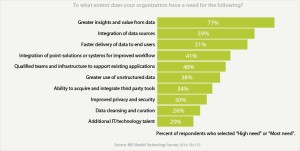 Over the next few years, large global pharma companies will need to wring out an additional $35 billion worth of efficiencies in order to drive profitability. While the industry has most of the patent cliff challenge behind it, companies face price constraints with respect to health reform, static national economies, and access demands.
Over the next few years, large global pharma companies will need to wring out an additional $35 billion worth of efficiencies in order to drive profitability. While the industry has most of the patent cliff challenge behind it, companies face price constraints with respect to health reform, static national economies, and access demands.
As the pharmaceutical industry enters the value-based health care era, the industry must catch up with other vertical markets in adopting information technology. In particular, pharma has been slower to migrate to the cloud than other businesses, with concerns about security and health care particular needs. Today, the industry can benefit from using third-party cloud-based applications to help hasten the shift to data storage in the cloud — and the resulting ability to drive data analytics in health care.
So asserts Riding the information technology wave in life sciences: Priorities, pitfalls and promise from IMS Institute of Healthcare Informatics, published March 2014.
To gauge life science leaders’ views on health information technology, IMS Institute surveyed 116 respondents representing pharma, biotech, diagnostic and medical device companies in January-February 2014.
For pharma and life science companies to be relevant and valued in health care, the industry needs to leverage data that’s been long locked up in individual silos both within the company and in other strategic business partners’ operations. Pharma must work to break down these silos to get to data liquidity – so-called interoperability — and drive insights through analytics. 74% of the organizations IMS surveyed said they had a “high level of need for greater insights” from these data.
As such, most respondents expect levels of spending on analytics; applications and systems integration; and, data sourcing, integration and curation to increase in the next five years. In comparison, investments in infrastructure, hardware and storage will tend to fall. About one-third believe spending on data security will grow.
Life science companies expect to engage with health IT leveraging third-party tools and fewer anticipating developing new applications internally.
In a conference call with Murray Aitken last week, Executive Director of IMS Institute told us attendees that he found a “positive tone” in the respondents embrace of cloud-based opportunities, which he believe the industry will use for both achieving greater internal operational efficiencies as well as engaging in different ways with other health industry stakeholders: payors, providers and patients.
Health Populi’s Hot Points: As comparative effectiveness and cost-benefit decisions will be made on new products launched in the market, pharma will need to be able to make the case for innovations in the value-based environment. Data residing in electronic health records and patient-generated databases can be aggregated, segmented, and analyzed to help drive better prescribing decisions at the point of care, driving population health outcomes.
Advances made in data analytics are indeed promising for synthesizing information about what works best in which patients in a particular stage of disease. That’s the positive use of Big Data in health care.
But patients/consumers need to understand this new world of personal health information (PHI) beyond their HIPAA-secure electronic health record. Do people who sign their providers’ HIPAA forms understand that third parties might have access to their PHI outside of the doctor’s office, other peer consulting physicians, and the local health system with which she is affiliated? Do providers understand ‘where’ their patients’ EHR data might migrate?
There’s no question that cloud-based computing for health will enable great strides in data management, analysis, and better-informed decisions at the point-of-care for physicians and self-care for patients. While value-based care demands that we do better and drive both efficiency and innovation, transparency is also an operational requirement to ensure that both providers and patients trust the brave new world of Big Data in Healthcare.




 I am so grateful to Tom Lawry for asking me to pen the foreword for his book, Health Care Nation,
I am so grateful to Tom Lawry for asking me to pen the foreword for his book, Health Care Nation,  I love sharing perspectives on what's shaping the future of health care, and appreciate the opportunity to be collaborating once again with Duke Corporate Education and a global client on 6th May. We'll be addressing some key pillars to consider in scenario planning such as growing consumerism in health care, technology (from AI to telehealth), climate change, and trust -- the key enabler for health engagement or dis-engagement and mis-information. I'm grateful to be affiliated with the corporate education provider
I love sharing perspectives on what's shaping the future of health care, and appreciate the opportunity to be collaborating once again with Duke Corporate Education and a global client on 6th May. We'll be addressing some key pillars to consider in scenario planning such as growing consumerism in health care, technology (from AI to telehealth), climate change, and trust -- the key enabler for health engagement or dis-engagement and mis-information. I'm grateful to be affiliated with the corporate education provider  Thank you FeedSpot for
Thank you FeedSpot for